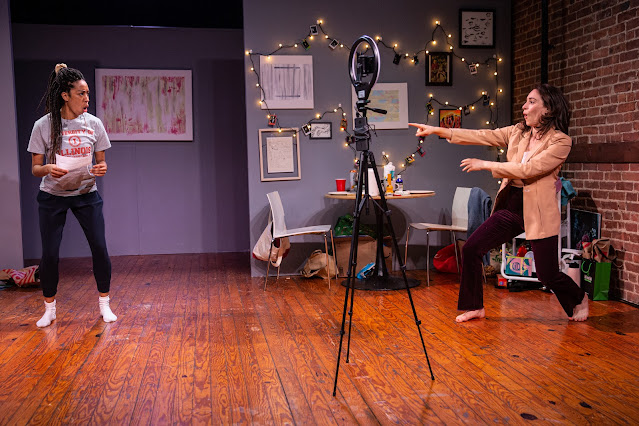cityscrape
Written by Sophie McIntosh
Directed by Nina Goodheart
12 St. Marks Place, Studio 3R, Manhattan, NYC (masks required)
May 18-28, 2023
 |
| Mia Fowler and Simone Policano. Photo courtesy of Good Apples Collective |
After last summer's widely praised macbitches (you can read our review here) delved into the female-friend-group machinations surrounding a university production of Macbeth, playwright Sophie McIntosh returns to themes around the perils, power, and pleasures of women's friendship among the under-30 creative class with her new play, cityscrape. cityscrape marks the engrossing debut production from McIntosh and director Nina Goodheart's Good Apples Collective, which aims to "empower emerging [queer and gender-marginalized] artists to … revolt against oppressive hierarchies." In part, cityscrape itself dramatizes the difficulties of scraping by as an emerging artist, at the same time as it casts a canny but empathetic eye on how friends grow apart and together; how intense, complex, and ambiguous those bonds can be; and how much that complexity can find itself heightened when artistic expression gets involved.
Kitt (Mia Fowler) and Kat (Simone Policano) do not have a particularly auspicious first meeting. Kat is unaware that her and Kitt's mutual friend Eileen (Marianna Gailus), who knows the former from undergraduate studies at NYU and the latter from childhood, has promised Kitt that she can sublet a room in the Brooklyn apartment that Kat shares with Eileen, helped by a subsidy from Eileen's wealthy parents. (Shifts from this very lived-in living space to the outdoors, primarily the building's rooftop, are accomplished via some cleverly minimalist illumination of a suggested city skyline.) As time moves on, however, tracked by the changing pages of a wall calendar (as well as some fantastic use of music during scene transitions), and with Eileen away at a tony law school, Kitt and Kat begin to embody the closeness that conjoining their character names would imply. Some of the effects of the increasing intimacy between the introverted, depressive Kitt and the determinedly unconstrained Kat are clearly positive, as when Kitt helps struggling actor Kat with an audition tape or Kat helps aspiring novelist Kitt to get in touch with certain parts of herself. At the same time, however, not only do the women also begin to pick up some of each other's less salubrious habits but each woman is tempted to undermine the other in the name of their relationship, and that is even before the way in which their lives together bleed into their art threatens catastrophe for their connection.
 |
| L to R: Marianna Gailus, Mia Fowler, and Simone Policano. Photo courtesy of Good Apples Collective |
As much as the play concerns itself with the ambiguities of intense relationships, it also depicts how such relationships can fade as the ways in which people chart their lives diverge. While Eileen misses some parts of performing, she is quite happily ticking all the boxes that the dominant heteropatriarchal capitalist culture would recommend, the same sort of culturally sanctioned life path that people like Kitt and Kat find connection in resisting. But here too the play fruitfully allows for some ambiguity: we might see a parallel, for example, between Eileen's justification that making art just wasn't making her happy and the suggestion that, even though Kat sees herself as a boundary-pushing serious artist, performing in a probably corporate-backed production for kids would in fact make her happy. Moreover,
cityscrape points to problematic aspects at both ends of this industry spectrum.
 |
| Simone Policano and Mia Fowler. Photo courtesy of Good Apples Collective |
Praiseworthy performances from the cast make it easy to get emotionally invested in these characters' emotional investments. Fowler and Policano deliver turns that are compellingly nuanced, riotously funny, and achingly vulnerable, rendering the energy between them almost palpable, a dynamic into which Gailus effortlessly slips when Eileen appears on the scene. In one of his late poems, Ted Hughes describes the creative process as nurtured on the blood of the artist and those close to her.
cityscrape deftly, entertainingly, and affectingly both captures this dimension of art-making and shows its similarities to–not to mention its collision with–the sort of bright-burning attachment that appears either enviable or codependent, depending on how you tilt your head.
-John R. Ziegler and Leah Richards






Comments
Post a Comment